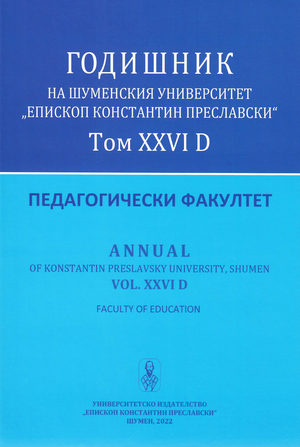Ефективност на формите за електронно обучение на учениците в прогимназиалния етап на училищното образование
Effectiveness of the Forms for Electronic Learning of Students in the Pre-Secondary Stage of School Education
Author(s): Penka KozhuharovaSubject(s): Social Sciences, Education, School education, Distance learning / e-learning
Published by: Шуменски университет »Епископ Константин Преславски«
Keywords: e-learning; blended learning; efficiency; students; school; information and communication technology
Summary/Abstract: Abstract: During the COVID19 pandemic, students and teachers gained unique experience in several forms of e-learning: learning in the traditional classroom "face-to-face", using electronic resources (e-assisted learning); hybrid learning with asynchronous communication and hybrid learning with synchronous communication. The assessment of the effectiveness of these forms is of key importance for determining the needs and requirements for the development of the electronic educational environment and the competences for working with information and communication technologies (ICT) of the participants in the educational process. The purpose of the study is to determine the effectiveness of different e-learning environments. The research was conducted using a survey method among 637 students from 47 secondary schools. A framework for testing the effectiveness of e-learning environments is applied, which includes indicators related to the organization of the learning process and to personal dimensions for its participants. As a result of the analysis, it was found that e-learning in the traditional classroom environment was evaluated with the highest levels of effectiveness for teaching new knowledge and forming skills. In a hybrid/synchronous e-learning environment, students engage in familiar teaching and learning structures and strategies, and the design of learning content in the e-learning environment has a significant impact on its applicability and learning outcomes. Students rated the effectiveness of this learning format in lessons to reinforce knowledge and skills as average. The lowest values for student satisfaction according to these indicators are in mixed/asynchronous learning. There were no significant differences in students' assessment of the effectiveness of e-learning and hybrid/synchronous learning in creative application of knowledge and skills and assessment of achievement. According to these indicators, blended/asynchronous learning has lower values.
Journal: Годишник на Шуменския университет „Епископ Константин Преславски“. Педагогически факултет
- Issue Year: XXVI/2022
- Issue No: 1
- Page Range: 625-635
- Page Count: 11
- Language: Bulgarian

